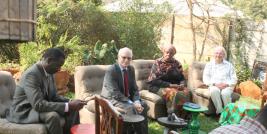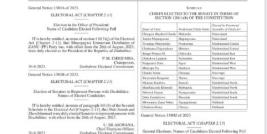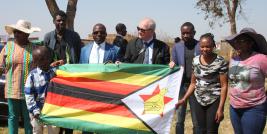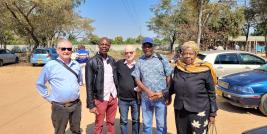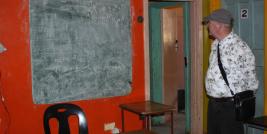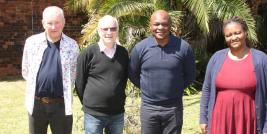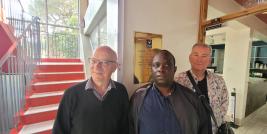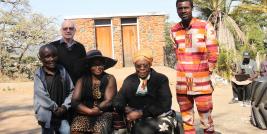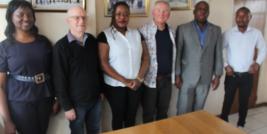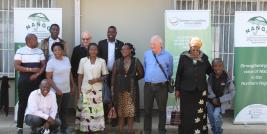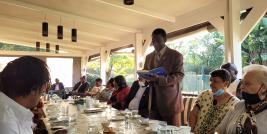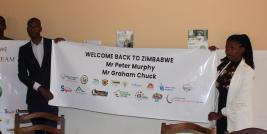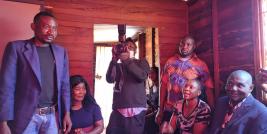Address to the University of Zimbabwe
23 April 2024
By Matthew Neuhaus
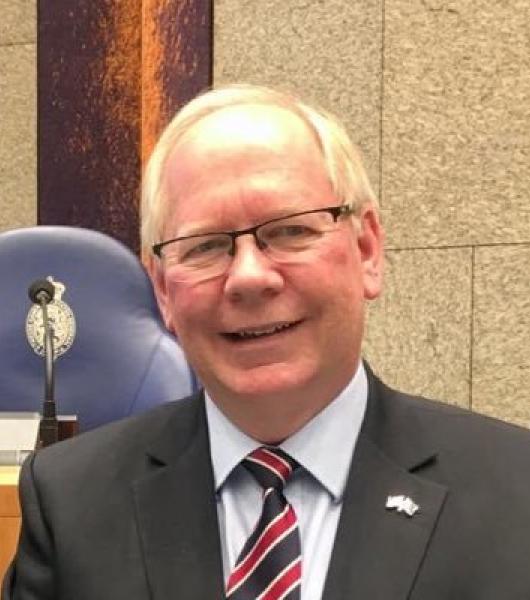
INTRODUCTION
Let me start by thanking the University of Zimbabwe, represented by the Pro-Vice Chancellor for the privilege of addressing you here tonight – and the magnificent choir and traditional music and dance group who have entertained us tonight.
I am honoured to be speaking in a tradition inaugurated by the wonderful former Prime Minister of New Zealand and UNDP Director General, Right Honourable Helen Clark, who I admire so much.
Let me also pay tribute to Honourable Sekai Holland and her husband Jim Holland who have done so much to organise this evening’s event, and who lead the important Zimbabwe Peacebuilding Initiative.
I would especially like to commend their work with both the boy child and girl child, of which we have already heard. Children are our future, and we should do everything to nurture them. If there is no peace in their childhood, it will be so much harder for them to have peace in their future.
At this moment we are especially concerned for the Palestinian children of Gaza who have been caught and are dying in the conflict between Israel and Hamas. I admire the steps taken by South Africa to take this matter before the International Court of Justice to seek an immediate ceasefire and a longer-term peaceful settlement in the region in line with international law. This is in the interests all its peoples and all its children.
I would also like to pay tribute to the Zimbabwe Information Centre in Sydney which supports the Hollands in their important work for peace. They were the key movers in the well-deserved award to then Senator Sekai Holland of the Sydney Peace Prize some years ago.
I also want to emphasise that while I was a former Australian Ambassador to Zimbabwe, the emphasis is on the former and I speak now in a fully private capacity.
I was appointed an Honorary Professor of International Law at the Australian National University following my retirement from the Australian diplomatic service last year on completion of my last posting as Australian Ambassador to the Netherlands.
I speak neither for the University nor the Australian Government so I can be critical, but I do believe Australia is a force for good in the world and continues to do much to support peacebuilding.
ZIMBABWE
Zimbabwe has meant a lot to me in my life and has always been part of my life.
I grew up in Tanzania in the 1960s and early 1970s as the child of Australian missionary parents, and so was very aware of the conflict in Rhodesia and the camps in Tanzania.
I first visited Zimbabwe in 1983, shortly after independence, en route to my first diplomatic posting in Nairobi, Kenya.
I then wrote my Master’s thesis at Cambridge University from 1985/86 on the Commonwealth’s Role in the Negotiation of Zimbabwe’s Independence, a role in which Australia played a significant part, both at the Lusaka Commonwealth Heads of Government Meeting (CHOGM) and Lancaster House. I would note that my study was used for later work we did on the Cambodian Peace Settlement and in supporting the end of apartheid in South Africa.
Later I was working for the Australian Prime Minister John Howard when we hosted the 2002 CHOGM in Australia, and from there I became Political Director of the Commonwealth Secretariat from 2002-2008, the period during which Zimbabwe was suspended and then withdrew from the Commonwealth.
I would want to emphasise that the Commonwealth never expelled Zimbabwe. It wanted to stay engaged during that troubled period when the Harare Principles were breached. But the late President Mugabe’s pride was hurt by the suspension, and he pulled out. Other suspended countries I worked with – Nigeria, Pakistan, Fiji for example – all did not pull out and all have resumed full membership.
I was then here as Australian Ambassador from 2011-2015 when we worked well with the power sharing Government of National Unity. I believe we pulled Zimbabwe back from the brink at that point, stabilising the economy and investing in infrastructure and development.
But we are not here tonight to talk about Zimbabwe. We are here to talk about lessons in Peacebuilding from my experience as a diplomat and in the Commonwealth. This is a similar talk to one I gave at a Peacebuilding Conference in Parliament House in Australia this February.
Shortly before that talk the Australian Foreign Minister Penny Wong spoke at a major Indian Ocean Conference in Perth, on 9 February, on Australia’s longstanding record in promoting peace in our region and beyond. It certainly rings true regarding the role then Australian Prime Minister Malcolm Fraser played in Zimbabwe, and I have lived that journey in my career.
In that speech, Penny Wong stated: “Australia will pursue a world where differences and disputes are settled through institutions, agreed rules and norms, and not by force and coercion”. This is the world we want. I now turn to my six lessons.
LESSON 1 – “Peacebuilding is pointless without addressing the fundamental concerns of all key players, men and women”.
Early in my career, I was posted in Papua New Guinea in the Pacific. In 1989 a rebellion broke out in one of its major island provinces of Bougainville. Bougainville was the location of a major copper mine, which contributed significantly to the wealth and economy of the country.
The rebellion was driven by unhappiness over the royalties and compensation due to the local landowners, environmental concerns, and a sense of political and economic disenfranchisement. Some of the rebels were armed and blew up the power lines leading up to the mine to bring its operations to a halt.
I was sent regularly during 1989 from the Australian High Commission to monitor that situation. There were several efforts at peacemaking, including traditional ceremonies at which spears were broken and the various parties, including the government, agreed to commit to a peaceful resolution of the problems.
But in fact, things got worse and as I left violent armed conflict increased between the rebels and the government, the mine had to be closed and expatriates evacuated. Bougainville descended into chaos and for years the people of the island suffered.
It was only when regional countries came into play, serious peace negotiations were undertaken with all the key stakeholders, including the women who had the ownership of the land and so were crucial to outcomes, a regional Bougainville Peace Monitoring Group was established, and greater autonomy was given to provincial government that some progress has made.
Even now more than thirty years later mining has not effectively recommenced and the province’s demand for independence, confirmed in a recent referendum, is still under negotiation. Bougainville remains a work in progress but it least it is peaceful, and it and PNG are committed to progress by peaceful means.
The important early lesson I learnt from this experience is that you cannot rush peace by empty gestures. You need to engage all stakeholders and their fundamental concerns and address them in a realistic manner.
LESSON 2 - “Ensure multi-dimensional integrated approaches are designed and implemented with the stakeholders”.
This leads on to this second lesson, and the example I want to give here is of the African nation of Sierra Leone. From 1997-2000 while Australian High Commissioner to Nigeria I was also accredited to Sierra Leone.
I did not get to present my credentials to President Kabbah till the year 2000 because of the conflict in that nation. When I did present credentials, my car was still shot at by rebels while I was returning from the Presidential palace. I was grateful the American Ambassador had lent me his armoured vehicle.
The Sierra Leone conflict was fuelled by the then President of Liberia, Charles Taylor, who was intent on exploiting the diamond resources in his neighbour – the so-called “blood diamonds”. Young boys were taken and turned into child soldiers, and often drugged and beaten.
So horrific were their terror tactics that they would ask their victims whether they wanted long sleeves or short sleeves. Long sleeves and your hands were cut off, short sleeves and your whole arm was cut off. You would see the maimed victims begging in the streets of Freetown.
With the support of the regional ECOWAS troops led by Nigeria, and with the UK and USA also engaged, the conflict was brought under control and President Kabbah was finally able to return. Peace negotiations were held with all the parties which led to President Taylor going into exile in Nigeria.
The stage was then sent for concerted peacebuilding in which the Commonwealth played a key role. Donors provided development assistance, investors returned to rebuild the country and the Commonwealth Secretariat had an important program rehabilitating child soldiers. They were educated and retrained in useful civilian occupations. Not easy but essential work.
Alongside peace it was important to have justice, and accountability by the leadership for the war crimes and atrocities which had been committed. So the Sierra Leone Special Court was set up. A key objective of the Court was to see Charles Taylor brought to justice. So it happened when he breached the terms of his exile in Nigeria and was forced to flee – into the arms of the Court.
For those who tell me peacebuilding and justice is impossible I like to point to Sierra Leone and Liberia today as stable peaceful African nations – and to the fact that Charles Taylor is in jail. But it requires commitment to multi-dimensional integrated approach in which all elements are addressed by the parties and the regional and international community work together.
LESSON 3 – “Regional and global players can help”.
The two examples I have already given have foreshadowed this point about the important role regional nations and the international community can play. But I want to give you a few more examples from my experience.
The first is Cambodia in Southeast Asia. In early 1990 I became involved in an initiative Australia led under our then Foreign Minister Gareth Evans working closely with the United Nations and regional and international partners for a peace plan for Cambodia. This followed many tragic years of devastation under the extremist genocidal regime of the Communist leader Pol Pot.
In Canberra and New York, I assisted with the legal drafts for a peace settlement and Constitution and support to the lead Australian negotiators in an agreement which brought together former King Sihanouk and the then young political leader Hun Sen. Eventually a UN Peacekeeping Force led by an Australian General John Sanderson was sent in to support the implementation of the process by the United Nations. It was difficult but successful and brought a lasting peace to Cambodia.
The second is Kenya in 2008, following an election in late 2007 which deteriorated into terrible ethnic violence. I set off for Nairobi to represent the Commonwealth and support my team who had been observing the elections. I know Kenya well and was shocked by how quickly things had deteriorated in this sophisticated African nation, and the murderous hate speech which came out of the mouths and the radio stations of some political leaders I met with.
As Commonwealth we met with a wide range of players, and I was particularly impressed by some former African leaders who stressed to me the need for an African-led solution. So it transpired that we all rallied around the efforts led by former UN Secretary General Kofi Annan, a man I deeply respected.
He brokered a peace deal and government of national unity in the short term, but also set in train fundamental reforms which saw changes to the judiciary and the electoral commission, and a new Constitution and fundamental reshaping of the provincial system. It has brought greater stability and prosperity to Kenya to this day.
I might also add the Kenya experience provided guidance for SADC and President Mbeki of South Africa later in 2008 when this country Zimbabwe also suffered from terribly violent elections which brought this country to the brink, and from which it too was rescued by a power-sharing government of national unity.
In all these cases the role of global and particularly regional players was important.
LESSON 4 - “Leaders need to demonstrate positive leadership”.
It might be self-evident that the role of leaders – of parties, of groups and of the nation – is essential to sustained peacebuilding. Without good and visionary leadership people literally can perish.
When I was Political Director at the Commonwealth Secretariat the issue of Rwanda’s interest in joining the Commonwealth came up in 2007, ahead of the CHOGM to be held in Kampala at the end of that year. So I went to Rwanda with my team to make an assessment of its readiness to join the Commonwealth.
I had grown up in the 1960s on the Tanzania border with Rwanda and was at the United Nations at the time of the terrible 1994 genocide, whose 30th anniversary we commemorate this week. So I was very familiar with Rwanda’s tragic history.
I met with President Kagame and asked him why Rwanda wanted to join the Commonwealth. His answer to me was “I want a bigger Rwanda”. I asked him what he meant by that, and he explained that only by the Rwandans being able to engage in the wider world – in the neighbouring East African Community, in the wider Commonwealth – would they stop looking inwards on each other in their tiny mountain country and fighting over their limited resources.
It was a good answer, and it is inspiring to see what Rwanda has achieved since joining the Commonwealth and how it has become a centre of development in East Africa. I am conscious of criticisms of President Kagame, who currently chairs the Commonwealth, but that does not detract from the achievements of Rwanda and its progress under his leadership.
I am also reminded of my period as High Commissioner in Nigeria from 1997-2000. When I arrived in Nigeria it had seen nothing but a succession of military coups since independence, as well as the terrible Biafran war. It was then ruled by the dictator General Abacha and suspended from the Commonwealth.
When presenting credentials, I had been asked to make representations by our former Prime Minister Malcolm Fraser on behalf of his friend former Nigerian President Obasanjo then in jail. It did not make the ceremony easy as Abacha, in dark glasses and a revolver beside him, became quite annoyed.
However, as fate would have it, Abacha died the following year of a heart attack. The General who took over from him, Abubakar, had trained in Canada. He was keen to re-engage with the Commonwealth and accepted our advice to release Obasanjo and other political leaders and hold democratic elections.
In that period, I became good friends with Obasanjo. He won the elections, and though a former General, established Nigeria on a firm democratic footing which has meant there have been no coups since that time. He also chaired the 2003 CHOGM, by which time I had joined the Commonwealth and worked closely with him on CHOGM. Leadership matters for sustainable peacebuilding.
LESSON 5 – “Engagement is essential, isolation seldom helps”.
When conflict breaks out and terrible things happen, sanctions to express condemnation and displeasure of these actions is understandable and often inevitable.
For a peacebuilder though, the ability to remain engaged, even with the worst actors, remains important. At some point in all conflicts, negotiations will be inevitable and will be needed to lay the foundation for peacebuilding.
This is why in the Commonwealth approach suspension of a member for breaching its values – by a military coup perhaps, or some particularly bad human rights or electoral or constitutional violations – goes hand in hand with efforts by the Secretariat to remain engaged.
This was the case in Nigeria in 1996 when it was suspended following the execution of Ogoni activist Ken Saro Wiwa despite assurances to President Mandela of South Africa that he would not do that. Commonwealth engagement meant though that when Abacha died, and democratic elections held in 1999, Nigeria returned to Commonwealth membership. I was fortunate to be there at the time and able to assist the Commonwealth Observer Group in observing those elections.
This was also the case in Pakistan, suspended following the coup by President Musharraf in 1999. I made several visits to Pakistan with Secretary General Don McKinnon to seek to persuade him to hold democratic elections.
We also engaged with other important players, including the United States. We even met with Vice-President Cheney at the White House. He looked a little sceptical, and said “But Musharraf, he’s our man”. But while focused on the war against terror, they too agreed democratic elections were necessary.
In due course Musharraf resigned in 2008 and elections were held, elections in which tragically my friend Benazir Bhutto was assassinated. After the elections Pakistan returned to full Commonwealth membership.
Similarly in Fiji. We were dismayed when Armed Forces Commander Bainimarama staged a coup in 2006 which led to immediate suspension. I made several visits to Fiji both then and when I returned to Australian Government service, urging a return to civilian rule. We also worked closely with the Pacific Islands Forum on this.
In due course Bainimarama stepped down from the military and ran successfully as Prime Minister. The suspension was lifted, and Fiji returned to Commonwealth membership.
All these are examples of how the Commonwealth remained engaged to support a return to civilian government and peacebuilding. It has been important to success.
LESSON 6 – “You have to keep working at it”.
The US author Robert Kagan has written an important book called “The Jungle Grows Back”. He argues that the international system of international law and what some call a rules-based order needs to be continually tended like a garden so that the jungle of conflict and power politics does not overwhelm it.
Peacebuilders are very conscious of this. Once you establish a peace, peace building and the struggle for peace and justice is forever. You must keep working at it. There will always be political players who want to corrupt and undermine it for their own selfish reasons.
In this regard institutions are very important to help protect peace. Of course, a Constitution is fundamental. The separation of powers between the Executive, the Parliament and the Judiciary in line with the Commonwealth Latimer House Principles – which Senator Holland is so fond of quoting – is fundamental.
Important also are an independent Electoral Commission, a Human Rights Commission, an Anti-Corruption Commission and of course a civil service which serves with integrity, providing frank and fearless advice well-founded in law and best practice. The military too must answer to civilian control and be non-partisan.
Even in developed democracies we need to keep working at this, as power so easily corrupts.
CONCLUSION
As this is Africa, we should conclude with an African Proverb. There is one that says before your cross a river look out first for the crocodiles. In other words, take account of the obstacles and seek to avoid them. There is more than one way of building peace, just like crossing a river. You might even build a canoe and take everyone with you on the journey. But the key thing is to get to the other side safely.
Are there any lessons for Zimbabwe in all I have said and the examples I have given? This is for you to conclude. But as young people you know what needs to be done in your own nation.
If there is no peacebuilding, I would argue that it is inevitable that conflict and disaster will follow, and people will suffer. When we look at Israel/Gaza; Yemen; Somalia; Sudan and Myanmar we see this so clearly. Ironically all these countries could have been Commonwealth members. One cannot help but wonder whether if they had been, would these conflicts have become so acute and difficult.
I would also comment that unlike elections, peacebuilding is not a one-day event. It is every day, and it goes on forever, seeking to establish a better society and nation. I wish you well in your peacebuilding journey.

